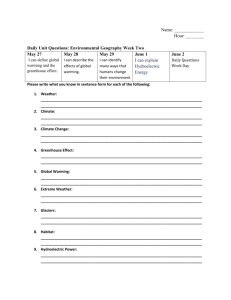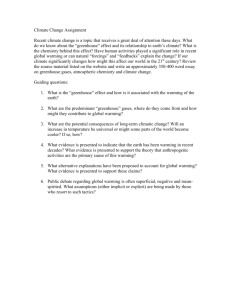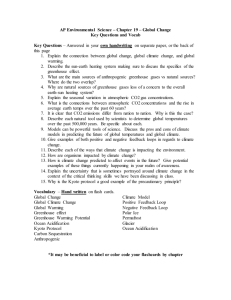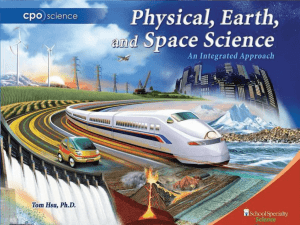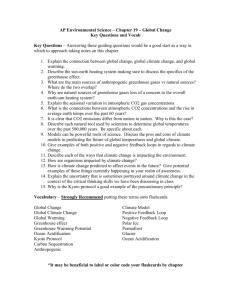Global Climate Change and Social Justice
advertisement
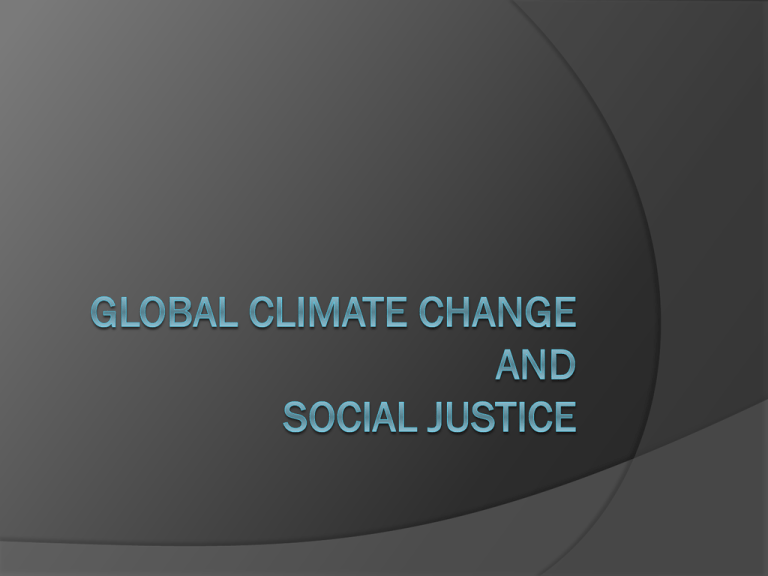
Past Climate Change Changes in climate are not new Earth has experienced long cycles of global warming and cooling Scientists have theories about why the climate changes over long periods of time Sun intensity, earth’s tilt, etc. The past 1000 years have been very stable – but the last century has encountered extremely unusual trends Greenhouse Effect The sun and the greenhouse gasses in the earth troposphere keep earth warm and hospitable Water, Carbon Dioxide, Methane, Nitrous Oxide The greenhouse effect keeps us alive Last century greenhouse gas emissions have skyrocketed More greenhouse gasses in our atmosphere trap the heat of the solar rays that reach earth So, the more greenhouse gasses the more heat stays on earth Human Impact of Climate Change Clear link between our emissions and the rise in global temperature Industrial Revolution sent CO2 emissions and the global temperature on a rapidly increasing trend We add to global warming by: Using fossil fuels, burning coal for electricity, cutting down forests, burning waste, and in tons of other ways – these are the most common and easily understood ways Indicators of Climate Change The earth is the hottest it has even been in 1000 years Since 1900, the average global temperature has risen .6-.8°C with most of this increase since 1980 10 warmest years since the 1800s has been since 1990 In the last 50 years, arctic temperatures have risen twice as fast as the temperature over the equator Glaciers and sea ice are melting at alarming rates “Permanent” Permafrost is melting in Alaska and Siberia Over the last century the sea level rose 20cm Some Effects of Climate Change Melting snow and ice Will cause sea levels to rise and throw off currents Rising sea levels Will displace millions and harm our ability to produce food Changing ocean currents Will alter weather patterns and make inhabited areas uninhabitable and farmable areas useless Warmer and more acidic seas Will also alter weather patterns and have catastrophic effects like those of the changing ocean currents Changes in weather Will make inhabited areas uninhabitable or un-farmable Lowering of biodiversity Will cause extinctions – the extinction rate is already 1000x what it was 1000 years ago Overall decrease in farming and fishing Lower our ability to produce food and feed the growing population Increase death rate Severely harm people’s way of life Rising Sea Levels By 2100 High projection +88cm Medium projection +50cm Low projection +10cm Flooding of coastal areas with massive populations: Ex. New York, London, Buenos Aires, Shanghai, etc. Submerge low-lying islands in Pacific Ex. Maldives Rising Sea Levels Continued Contaminate coastal aquifers with saltwater Would leave many developing countries without water Flood agricultural lowlands and deltas in southeast Asia Displacing millions of people Destroying Asia’s main food source (rice) Disrupt other food sources Agriculture and Fisheries Effects on People Heat stress will be more frequent and kill more and more people – especially elderly and sick The spread of malaria, dengue fever, and yellow fever will increase – especially in developing countries More insects, and pests that will harm human populations and food sources Flooding and drought will produce 150-250 million environmental refugees An estimated 150,000 people die from a cause linked to climate change Number expected to double by 2030 Number expected to be in the millions by the next century Cultures are being destroyed and populations, especially in developing countries, and starting to feel the effects of climate change, but this is only the beginning Highland Dwelling People of Peru The potato is a very important crop for the highland dwelling people of Peru Climate change has lead to warmer temperatures for this region which has made the potatoes susceptible to a plant disease that caused the Irish potato famine Similarly to Ireland, for these people the potato is not just a food but it is a part of their culture and a necessity that they cannot live without Communities in the mountains of Peru that are being effected by the loss of the potato are being forced to move – those who are not are facing many deaths in their communities due to lack of food Indigenous Tribes of the Amazon Deforestation in the Amazon to make roads not only eliminates trees that clean CO2 out of the atmosphere but also aids in the spread of Malaria The road construction creates puddles that are perfect habitats for infected mosquitoes This is a prime example of how the contributors of global warming such as deforestation and air pollution not only cause global warming but hurt people as well – this is a very common trend in global warming contributors Greek People of Crete This summer a heat wave hit Crete that the islanders will never forget Temperatures caused wildfires, electricity blackouts and deaths Farmland on the island has dried up, some of which has not recovered for this years farming season This is a great example of how a slight change in weather patterns can greatly impact a community Kenyan Tribes Water is becoming scarcer in many parts of Africa due to an increasingly dryer climate due to climate change Kenya is one place where water is becoming a source of conflict Kenyan tribes are battling and raiding each other’s villages killing tons of people for access to resources The resources are shrinking and water wars are not just anticipated, they have started Tuareg Tribes of the South Sahara The Tuareg people have a culture of being nomads who wander around Africa just south of the Saharan desert They live off their animals and survive by breeding and trading them Recently, the Tuareg people have been forced to settle down and farm in one place due to drought caused by an increasingly dryer climate in northern Africa – their traditional way of life is no longer sustainable This is a good example of how climate change can even destroy cultures and traditional ways of life Residents of the Niger Delta Nigeria is Africa’s top oil exporting nation The gas companies located in Nigeria have been burning off unwanted natural gas released during oil production This flaring of unwanted gas emits more CO2 and greenhouse gases more than any other single source in Africa south of the Sahara The residences living around the area are feeling the effects of the oil companies doing this Many chronic health and environmental problems have been increasingly problematic in the surrounding areas The burning off of this unwanted gas is ruining lives and adding to global climate change – a very common trend Tibetan Buddhists The Mingyong glacier is melting on the Tibetan plateau. Scientists project that the glacier is receding at about 150 feet per year The residences of a small village surrounding the glacier are Buddhist, and the glacier is one of the most holy peaks in the Buddhist tradition The disappearance of this holy place will be a disaster for the Buddhist religion In addition, if the glacier shrinks or disappears, the number of people that will go through the village will diminish and the village’s source of income will be gone This is an example of how even a religion can be hurt as an effect of climate change and global warming People of the Maldives The Maldives is a nation in the Indian Ocean made up of small lowlying islands 80% of the 1,192 islands that make up the nation lie less than 1 meter above sea level If sea levels rise at the project rate, the country will be under water and its 295,000 inhabitants will be forced to migrate Urban Populations of Developed Countries 70,000 Europeans died during a heat wave four summers ago Chicago, London, Athens and Tokyo have had epidemics of fatal heat stroke These heat waves will become more and more frequent and become more and more intense as climate change continues Large cities toward the equator will be hit the hardest, but the heat will spread north and south from the equator The developed world is not exempt from the effects of global warming though we have resources to make it less of a bother Farmers in Australia Australia is the driest inhabited continent Most of Australia is getting even drier, putting most ranchers at risk of their farmland becoming useless while a few ranchers are actually seeing an increase of rain on their farm This is common and a trend that will be seen around the world – some may actually benefit from the changes (i.e. Canada), but most will not The cons heavily outweigh the pros Venetians Venetians no longer live on the ground floor Rising sea levels have caused the entire city to move upstairs The water is now 11 inches higher than it was 100 years ago This has caused many of the buildings to flood and become useless A vital part of Italian culture will soon have to be abandoned if climate change continues on its current path Dealing With Global Warming Cutting fossil fuels Shift to more efficient energy sources Transfer energy efficiency to developing countries Reduce deforestation Use more sustainable agriculture Reduce poverty Slow population growth What You Can Do Drive a fuel-efficient car, bike, carpool, and use mass transit Use energy efficient windows Use energy efficient appliances and lights Heavily insulate your home Use compact fluorescent light bulbs Plant trees Wash laundry in warm or cold water Use low-flow shower head Buy products from companies who support the environmental movement Demand that government make climate change an urgent priority Our Duty We are the one’s who are capable of making this change It is our duty to do so for the sake of all those who will be the most greatly impacted – the impoverished We do not feel the consequences, but it is our duty to ameliorate the situation Do your part, in every way you are helping prevent climate change you are helping the impoverished people of the world It is all of our duties to be a steward of the earth Take part in a mission trip through your own home – go green! Sources http://www.npr.org http://www.epa.gov http://wwf.panda.org/about_our_earth/ab outcc/ www.edf.org www.globalwarming.org www.cosum.org/global_warming_as_a _stewardship.html Living Justice and Peace
